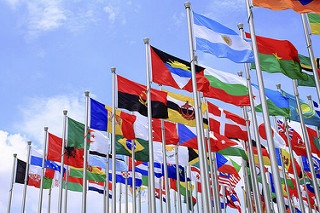
Flickr user Penn State
It’s possible that you’ve heard the term “Fulbright” before, but you might not have had it explained to you. It’s just another grant to apply for, right? Yes and no. As someone currently going through the application process, I can tell you that it is a wee bit more than that. It is a great way to apply those languages skills you acquired in high school or college. It is a fully-funded (for the most part; if you plan on travelling extensively, you might have to provide additional funds) academic year abroad where you can enroll in a graduate program, do research, work on creative projects, or teach English, to name a few things. It is an educational and cultural exchange, an opportunity travel to the country that inspired you to pick up Spanish, German, Russian, Arabic, or whichever language you decided to learn
The History:
In 1946, President Truman signed a bill proposed by Senator J. Williams Fulbright, which would become the largest education program in history. Titled the “Fulbright Program”, it aims to foster understanding and compassion between countries. The hope is that such exchanges will help to promote peace in the world. Coming right on the tail end of World War II, only four countries had joined the agreement by 1948: Now over 140 countries are available for recent college graduates, graduate students, scholars, and professionals.
What It Entails:
The Fulbright Program is an umbrella title with many sub-programs. The one this article focuses on is the Fulbright U.S. Student Program. This particular program sends recent college graduates abroad for the duration of a school year (the length dependent on which country one applies to). Primarily, students apply for a Study/Research Grant or to be an English Teaching Assistant (ETA). Study/Research Grants are for creative projects, studying abroad, and conducting research. ETAs go to work in classrooms, generally high school or college level, to help teach conversational English.
There are also two Special Programs: the Fulbright-Hillary Rodham Clinton Fellowships, which places U.S. citizens to be placed in professional positions in a foreign government ministry, and the Fulbright-National Geographic Digital Storytelling Fellowships, which send U.S. citizens abroad (in one, two, or three countries) for the duration of an academic year to create a digital project on a relevant issue in that area.

Application Requirements:
Applications submitted are for the following year. Students who have graduated by the time the grant begins can apply, in addition to recent graduates and graduate students. Applicants must fill out the online form (complete with essays and short answers) and turn it in before the national deadline (generally early October). All applicants must have three people who will write referrals. They will also need to have their foreign language skills evaluated if the country they are applying to has a language requirement or recommendation. Study/Research applicants will also need letters of affiliation from any colleges or universities they intend to stay with during their stay. Specific requirements and duties are found on each country’s page on the Fulbright website.
The Fulbright-Clinton Fellowship and the Fulbright-National Geographic Digital Storytelling Fellowship applications have additional components.
Some Tips:
Many schools have Fulbright Advisors. Even if you have already graduated, you can apply through your alma mater (the other option being applying At Large). It is highly beneficial to talk to the advisor as early as possible once the application opens up in the spring. They know what the committees are looking for in applicants and therefore can help tailor your application.
Even if you are going through your alma mater and have a Fulbright Advisor, it is vital to have people who will read over your essays. The essays must be precise and specific, and they must answer all of the questions the prompts ask. Given how little space you have, this can be difficult. It helps write everything you can think of that might be applicable and then cut it down to the length requirement. Have your proof-readers look for ways you might be able to say something better. Encourage them to point out places where they need more specifics.
You have to demonstrate a genuine interest in the country you are applying to. Your essays can’t read as though they could be for anywhere. This means that if you haven’t done any yet, you should research the country where you want to go. Know something of the people’s history, political and cultural. Know who the famous authors are, what art, music, and literature have had an impact on the culture there. What is the primary religion? What is a way you can engage with the community outside your grant purpose/duties?
—
Use College Raptor’s free match tool to discover personalized net price estimates for colleges around the country!





